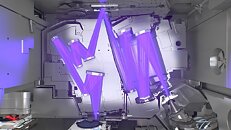TheLostSwede
News Editor
- Joined
- Nov 11, 2004
- Messages
- 18,861 (2.50/day)
- Location
- Sweden
| System Name | Overlord Mk MLI |
|---|---|
| Processor | AMD Ryzen 7 7800X3D |
| Motherboard | Gigabyte X670E Aorus Master |
| Cooling | Noctua NH-D15 SE with offsets |
| Memory | 32GB Team T-Create Expert DDR5 6000 MHz @ CL30-34-34-68 |
| Video Card(s) | Gainward GeForce RTX 4080 Phantom GS |
| Storage | 1TB Solidigm P44 Pro, 2 TB Corsair MP600 Pro, 2TB Kingston KC3000 |
| Display(s) | Acer XV272K LVbmiipruzx 4K@160Hz |
| Case | Fractal Design Torrent Compact |
| Audio Device(s) | Corsair Virtuoso SE |
| Power Supply | be quiet! Pure Power 12 M 850 W |
| Mouse | Logitech G502 Lightspeed |
| Keyboard | Corsair K70 Max |
| Software | Windows 10 Pro |
| Benchmark Scores | https://valid.x86.fr/yfsd9w |
There have been several announcements of new semiconductor fabs being built all over the world, but those fabs might end up being empty shells, all because of a single company. ASML or Advanced Semiconductor Materials Lithography if you prefer, is a Dutch company that produces various types of photolithography machines that are used to produce semiconductors. They're the world leader in their field and their machines are used by the likes of Intel and TSMC to do the physical etching of the silicon wafers that semiconductors are produced from. Now a warning from ASML's CEO, Peter Wennink has arrived, stating that the company can't keep up with demand.
The company isn't expecting to fulfil orders for at least the next couple of years, despite expecting to ship more machines this year than last year and more machines next year than this year. As each of these machines are largely custom made for its customers and hand built, due to the low production volumes, it takes a lot of time to construct each of these huge machines. Wennink said that the company "really needs to step up our capacity significantly more than 50 per cent. That will take time."

With some 700 different component suppliers, of which 200 are said to be critical, a lot also depends on its partners, if ASML is going to be able to increase its production volume. One of its key partners is Carl Zeiss, as they supply the optical lenses used in the machines as part of the etching process. According to Wennink, Carl Zeiss is currently unable to ramp their production of lenses at the same speed that ASML needs them and is as such, trying to push Zeiss into building a new cleanroom factory, so more lenses can be produced. " Once a factory is ready, they need to order the manufacturing equipment; they need to hire people. And then. . . it takes more than 12 months to make the lens."
This doesn't take into account the extra staff that ASML needs at its own factories to be able to ramp production, although Wennink says that the company has been working on this and other issues for some time already. ASML doesn't have any direct competitors either, so it's not as if Intel, TSMC and all the other foundries out there can turn to someone else for these machines, which places ASML in what one could call a monopoly position. The irony in the situation is hard to miss, especially considering the concerns that Intel's CEO has been voicing about foundry monopolies, yet Intel has to rely on the same supplier as everyone else for the machines that are needed to make its chips.
View at TechPowerUp Main Site | Source
The company isn't expecting to fulfil orders for at least the next couple of years, despite expecting to ship more machines this year than last year and more machines next year than this year. As each of these machines are largely custom made for its customers and hand built, due to the low production volumes, it takes a lot of time to construct each of these huge machines. Wennink said that the company "really needs to step up our capacity significantly more than 50 per cent. That will take time."

With some 700 different component suppliers, of which 200 are said to be critical, a lot also depends on its partners, if ASML is going to be able to increase its production volume. One of its key partners is Carl Zeiss, as they supply the optical lenses used in the machines as part of the etching process. According to Wennink, Carl Zeiss is currently unable to ramp their production of lenses at the same speed that ASML needs them and is as such, trying to push Zeiss into building a new cleanroom factory, so more lenses can be produced. " Once a factory is ready, they need to order the manufacturing equipment; they need to hire people. And then. . . it takes more than 12 months to make the lens."
This doesn't take into account the extra staff that ASML needs at its own factories to be able to ramp production, although Wennink says that the company has been working on this and other issues for some time already. ASML doesn't have any direct competitors either, so it's not as if Intel, TSMC and all the other foundries out there can turn to someone else for these machines, which places ASML in what one could call a monopoly position. The irony in the situation is hard to miss, especially considering the concerns that Intel's CEO has been voicing about foundry monopolies, yet Intel has to rely on the same supplier as everyone else for the machines that are needed to make its chips.
View at TechPowerUp Main Site | Source




